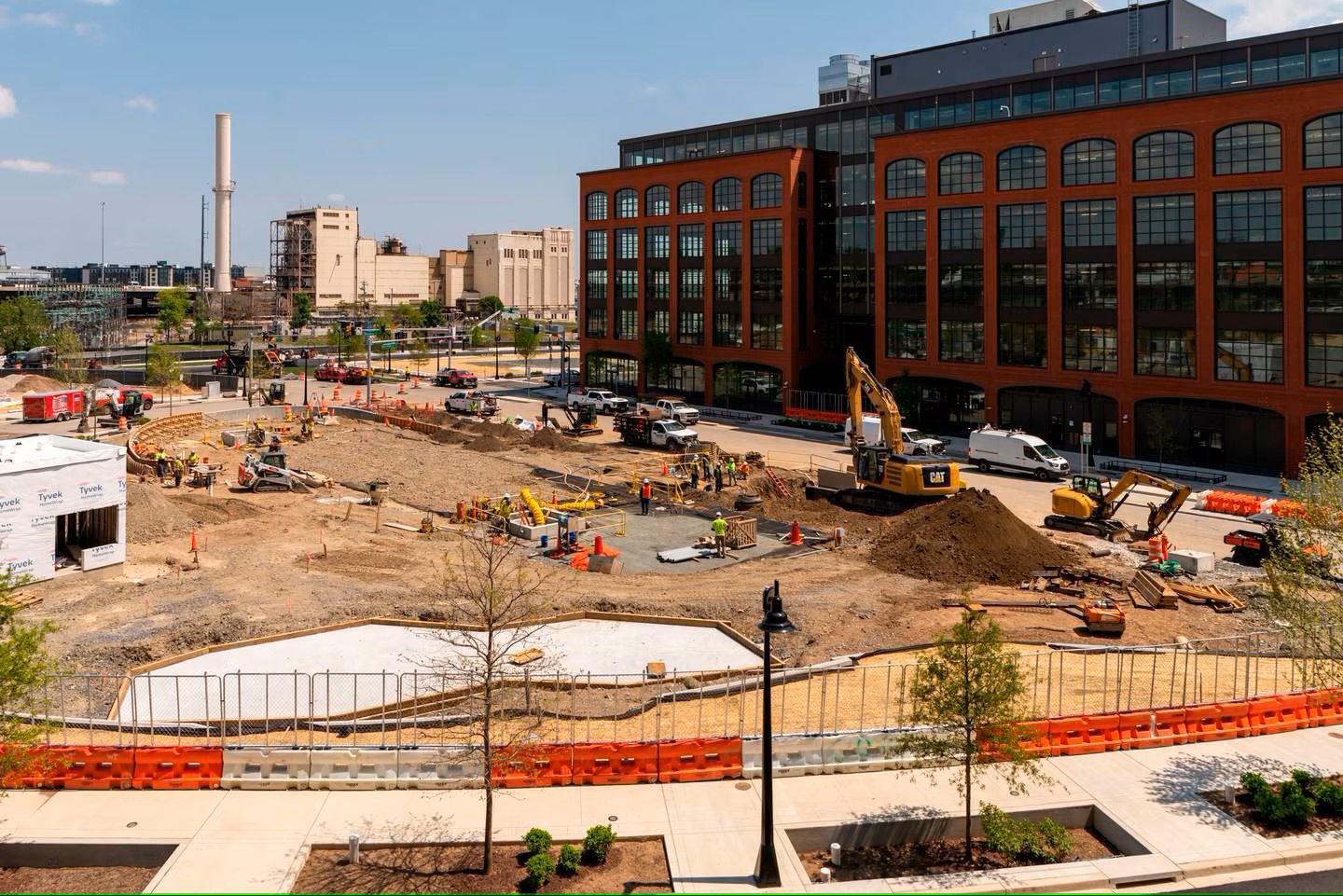
Residents and businesses are moving to the Baltimore Peninsula. Here’s a first look.
Published on: April 27, 2023 2:13 PM EDT|Updated on: April 28, 2023 9:58 AM EDT
:quality(70)/cloudfront-us-east-1.images.arcpublishing.com/baltimorebanner/LK7TCI7AWFAUVDANCJEHUQOMVM.JPG)
Our nonprofit news organization is made possible by subscribers and donors who value storytelling that impacts and uplifts communities. Thank you for supporting our journalism.
Commercial, retail and residential spaces have opened at Baltimore Peninsula, the ambitious, 235-acre mixed-use development on the site of an old industrial port in South Baltimore’s Port Covington neighborhood.
The first few office tenants and residents have moved into three newly constructed buildings at the historically underutilized site, which neighbors several predominantly Black communities to its south.
MaryAnne Gilmartin, founder and CEO of MAG Partners, the lead developer, is not stopping there.
“We need Baltimore to be on everybody’s radar,” she said.
More than 800 townhomes, a large entertainment venue and plans to reconfigure major nearby roads and highways are also in the works for the multi-block project, spanning some 200 acres. Existing tenants there include City Garage, Sagamore Spirit Distillery and Rye Street Tavern.
Hotly contested due to its record-breaking tax increment financing package — which allows developers to use property taxes generated at the site to pay back bonds issued early on for public infrastructure needs — the $5.5 billion waterfront venture promises more than 14 million square feet of new construction upon its completion. City residents, housing activists and economic watchdog groups also have opposed the use of such a large incentive — City Council approved $660 million in tax increment financing funds in 2016 — given Baltimore’s other pressing and existing needs.
Baltimore could be on the hook to pay back the bond costs if developers fail to lease up the site, which has only landed two new office tenants so far. Between the first two residential buildings, 11 units have been leased.
The H. Chambers Company, a planning and design firm specializing in private clubs and hospitality, is the first tenant to occupy an office within the Rye Street Market business complex located at 2455 House St. The company signed on for about 9,000 square feet of space.
:quality(70)/cloudfront-us-east-1.images.arcpublishing.com/baltimorebanner/P5XIEZ7JQBELXELYZFPZR3HZJQ.JPG)
The building can accommodate smaller businesses with spaces around 25,000 square feet, but there are larger floor plans as well. The rooms are divided by glass walls and doors, and “the sun, the light and air is abundant in the all corners of the floor plate,” Gilmartin said.
:quality(70)/cloudfront-us-east-1.images.arcpublishing.com/baltimorebanner/D24LZ6TGNRD23FWXEWEHFLVU7E.JPG)
Robert Hickman, board chair of the design firm, said the company looked all over the region for their sixth office location.
But it was the Baltimore Peninsula that offered a place that was “really special,” he said, including access to an outdoor balcony.
“We needed something that really brings the outdoors in. And we deal in the world of private clubs … it’s all about inside outside,” Hickman said.
:quality(70)/cloudfront-us-east-1.images.arcpublishing.com/baltimorebanner/AZNPXCI2ORAVVLYJ77G6NIHAVQ.JPG)
CFG Bank has also signed on to lease about 100,000 square feet in Baltimore Peninsula. They plan to move in by the end of 2023.
By 2024, Gilmartin expects enough activity to get nearly 75% of the commercial space leased, she said.
:quality(70)/cloudfront-us-east-1.images.arcpublishing.com/baltimorebanner/7R7W7GS4J5HU3KY2K6ROI5IJWU.JPG)
Just across the courtyard are two mixed-use apartments buildings, Rye House and 250 Mission, where maritime-inspired units — with natural wood, and glass and steel finishings — are available. Other amenities include ample green spaces, co-working spaces and some Juliet balconies.
:quality(70)/cloudfront-us-east-1.images.arcpublishing.com/baltimorebanner/AITA3KTC2FARFJNJHC2WLGDMVE.JPG)
Ryan Watts, the general manager at real estate developer Bozzuto, said the leasing since early April amounts to 15% of the units at Rye House and 10% of the units at 250 Mission.
Of the 416 units at Rye House, 54 will be dedicated to households earning 80% of the area median income, or AMI, while another 35 will be dedicated to those earning 50% of the AMI.
:quality(70)/cloudfront-us-east-1.images.arcpublishing.com/baltimorebanner/HBKL4JNMVVGRLLI4PYWKVOSZKE.JPG)
Last year, New York-based MAG Partners and the San Francisco-based MacFarlane Partners took over the large-scale development, first pitched in 2016 by Under Armour founder Kevin Plank and his Sagamore Ventures development firm. Plank and his associates began buying up the land for the site about a decade ago. Since then, sales at the sportswear company have dropped, and the company has scaled back plans for its new Baltimore Peninsula offices.
In November, developers at MAG and the San Francisco-based MacFarlane Partners rebranded the development, changing the name to the Baltimore Peninsula from Port Covington. They said they hoped to turn a page on some of the project’s contentious history.
Sagamore Ventures still maintains a “major equity stake” in the project, and a new corporate headquarters for Under Armour is slated to open in the fourth quarter of 2024.
:quality(70)/cloudfront-us-east-1.images.arcpublishing.com/baltimorebanner/4L5D2PFWYFFZFA63GVKQFKHYF4.JPG)
Gilmartin said the master plan allows for flexibility, and she envisions building a large entertainment or sports venue, as well as an accompanying hotel and conference center.
She also thinks the project’s scale and easy access to a major highway will make it attractive to the film industry.
“And so we are looking at ways the public sector could develop programs that will attract to that industry, because they’re really good jobs; they train the people both on the other side of the camera and behind the camera,” she said. “And they need the kind of space that our master plan is conducive for.”
Baltimore Banner reporter Hallie Miller contributed to this story.
View Source


:quality(70)/cloudfront-us-east-1.images.arcpublishing.com/tronc/VQQ4J3ADKRGFJNDWGPAX3HCVFU.jpg)
:quality(70)/cloudfront-us-east-1.images.arcpublishing.com/tronc/FFGDA2OHNVGQZA33RKOPCVCZLA.jpg)


